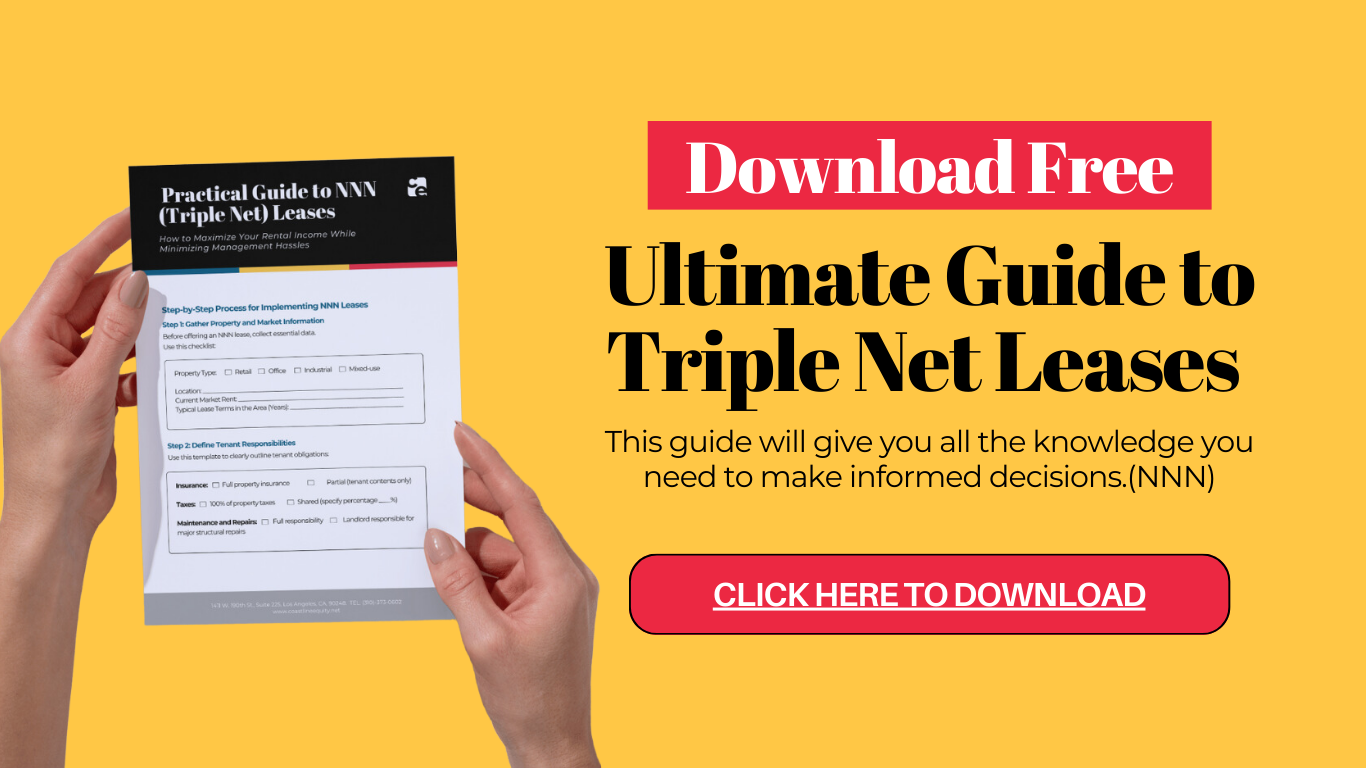Understanding the NNN Structure
What is a NNN Lease? Understanding Its Structure and Benefits for Investors
A triple net lease, often called an NNN lease, is a type of commercial real estate agreement where you, as the tenant, take on many of the property’s operating expenses.
In this lease, you pay not only base rent but also property taxes, insurance, and maintenance costs. This arrangement provides a clear understanding of your total financial obligations while allowing landlords to enjoy a more stable income stream.
Choosing an NNN lease can be beneficial, especially if you prefer more control over the property. Understanding how this lease type differs from others, like single and double net leases, helps you make informed decisions about your investments. This knowledge is vital for anyone looking to lease commercial space successfully.
Key Takeaways
- A triple net lease requires tenants to pay for all operating costs.
- It offers advantages like budget control and predictable expenses.
- Understanding lease types can help in making better investment choices.
Understanding NNN Leases
NNN leases, also known as triple net leases, shift many property-related expenses from landlords to tenants. This structure can offer benefits for both parties, but it's essential to understand its components and variations.
Definition and Structure
A triple net lease (NNN) is a lease agreement where you, as the tenant, agree to pay not only the rent but also three primary types of operating expenses: property taxes, building insurance, and maintenance costs. This means you'll handle expenses that would typically fall on the landlord in a conventional lease.
The terms of an NNN lease can vary, but the fundamental structure remains the same. You often pay a base rent, along with your share of these additional costs. This arrangement provides landlords with predictable income while giving you more control over the property maintenance and management.
Types of Net Leases
There are different types of net leases, each designed for various needs. The main types include:
- Single Net Lease (N): You pay base rent and property taxes. The landlord covers maintenance and insurance.
- Double Net Lease (NN): You cover rent, property taxes, and insurance, while the landlord takes care of maintenance.
- Absolute Net Lease: This is more strict than a typical NNN lease. You are responsible for all costs, including structural repairs, which offers the landlord maximum security.
Each type of net lease has its benefits and drawbacks. Understanding these gives you the insight to choose the right agreement for your business or investment strategy.
Financial Implications
Understanding the financial implications of a triple net lease (NNN) is crucial for both tenants and landlords. You will need to navigate costs, responsibilities, and potential financial risks linked to this type of lease agreement.
Costs and Responsibilities
In a triple net lease, the tenant agrees to cover various costs beyond base rent. These typically include property taxes, insurance premiums, and maintenance costs.
- Base Rent: This is the amount you pay for occupying the space. It serves as the foundation for total monthly rent.
- Operating Expenses: These can fluctuate, impacting your total financial obligations.
For example, a rise in property taxes or insurance can increase your monthly expenses significantly. It's vital to budget for these potential costs, as they can create a substantial financial burden over the lease term.
Moreover, if a tenant defaults, landlords may face cash flow issues. Understanding these responsibilities helps in managing costs effectively.
Tenant and Landlord Perspectives
From the tenant's angle, an NNN lease can be beneficial due to predictable expenses. You know what to expect each month, which aids in planning your cash flows and budgets.
For landlords, this lease structure can stabilize income. With tenants covering operating expenses, landlords can enjoy steady income without worrying about fluctuating costs.
However, there's a trade-off. While the landlord benefits from reduced management responsibilities, they also take on the financial risks linked to tenant defaults. If a tenant fails to pay rent, the landlord may face significant financial challenges.
It’s essential to weigh these factors carefully to make informed decisions about your lease
agreements.
Comparing Lease Types
When you explore different lease types, understanding their structures and responsibilities is crucial. This helps you make informed decisions, based on your investment goals or property management needs.
NNN vs. Gross and Hybrid Leases
A triple net lease (NNN) places most financial responsibilities on you, the tenant. You pay not just rent but also property taxes, insurance, and maintenance costs. This means you have more control over how these expenses are managed.
In contrast, a gross lease simplifies your costs. Here, the landlord covers most expenses, providing you with predictable monthly payments. In this scenario, expenses like insurance coverage and property management are handled by the landlord.
Hybrid leases combine features of both. You may pay a lower base rent with some costs included. This gives you a balance between control and predictability, allowing for customized arrangements based on your needs.
Strategic Considerations
When entering into a triple net lease, it’s crucial to consider various investment and market factors along with strategies to manage risks effectively. Understanding these elements can inform your decisions and help safeguard your investment.
Investment and Market Factors
Your investment strategy should reflect current market conditions. Triple net lease properties can vary significantly in value based on location and tenant profile. Look for stable areas with strong demand to assure consistent cash flow.
Evaluate tenant creditworthiness, as this directly impacts your income stability. A tenant with a solid financial background can lower your risk of missed payments. In addition, consider operational costs, including maintenance expenses and common area maintenance (CAM) charges.
Tax deductions associated with property depreciation can enhance your returns. Assess potential risks such as economic downturns that might affect rental income. Having a strategy to navigate these market fluctuations is vital.
Managing and Mitigating Risks
Managing risks in a triple net lease involves planning for unexpected costs. Your lease should clearly outline maintenance responsibilities. Consider including expense reimbursements in the lease agreement to protect against rising operational costs.
Regular property upkeep is essential to avoid major repairs down the line. Establish a routine maintenance schedule and budget for these expenses to prevent unexpected financial strain.
Conduct thorough research on tenants to mitigate tenant credit risk. Secure leases with reputable businesses to reduce the likelihood of eviction or vacancy. Preparing for various scenarios can fortify your investment against unforeseen difficulties while maximizing passive income.
Frequently Asked Questions
This section addresses common questions about triple net leases. It covers tenant responsibilities, comparisons with gross leases, examples of lease structures, potential disadvantages, operating costs, and factors to consider when investing in NNN properties.
What are the tenant's responsibilities in a triple net lease?
In a triple net lease, you are responsible for paying not just the base rent, but also property taxes, insurance premiums, and maintenance costs. This means you take on additional financial duties that landlords typically cover in other lease types.
How is a triple net lease different from a gross lease?
A triple net lease requires you to pay several additional costs. In contrast, a gross lease typically includes all or most expenses, such as taxes and maintenance, in the rent amount. Your obligations in a gross lease are often simpler.
Can you provide an example of a triple net lease structure?
In a typical triple net lease structure, you pay a base rent plus the three "nets": property tax, insurance, and maintenance costs. For instance, if the base rent is $3,000 per month, you might also pay an additional $500 for these other expenses.
What are the potential disadvantages for tenants in a triple net lease?
One disadvantage you may face is the unpredictability of additional costs. These expenses can change based on property taxes or insurance rates. This can make budgeting more challenging compared to leases where costs are fixed.
How can a triple net lease impact a tenant's operating costs?
A triple net lease can significantly increase your operating costs. Since you pay for maintenance and other directly related expenses, your monthly outflow can vary widely. Understanding these costs is crucial for accurate financial planning.
What factors should be considered before investing in an NNN property?
Before investing in an NNN property, consider location, property condition, and tenant creditworthiness.
Also, research the local market trends and potential for rent increases. These factors will affect both your investment return and long-term lease stability.
More about Coastline Equity
Property Management Services
 Learn More
Learn MoreOur team will handle all your property needs, offering specialized services such as in-depth inspections, liability management, staff recruitment and training, and round-the-clock maintenance—expert support tailored to the unique requirements of your real estate assets.
About Us
 Learn More
Learn MoreOur dedicated team transforms property management challenges into opportunities. From tenant management to streamlined rent collection and proactive maintenance.
Property Management Excellence
 Learn More
Learn MoreAs a contributing author for Forbes, Anthony A. Luna brings a wealth of expertise and knowledge in the property management industry, real estate sector, and entrepreneurship, providing insights and thought-provoking analysis on a range of topics including property management, industry innovation, and leadership.
Anthony has established himself as a leading voice in the business community. Through his contributions to Forbes, Anthony is set to publish his first book, "Property Management Excellence" in April 2025 with Forbes Books.
Insights
 Learn More
Learn MoreLearn more about Coastline Equity's property management practices & processes and how we support our clients with education and a growth mindset.
Coastline Equity Property Management is your partner as you continue to learn and grow.
News & Updates
Property Management Made Easy
Los Angeles
1411 W. 190th St.,
Suite 225
Los Angeles, CA 90248
Temecula
41743 Enterprise Circle N.,
Suite 207
Temecula, CA 92590
P.O. BOX #1489
TORRANCE, CA 90505








